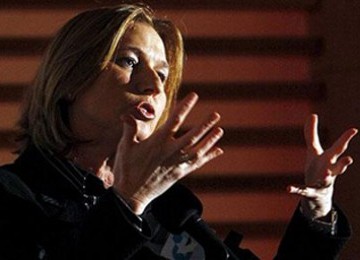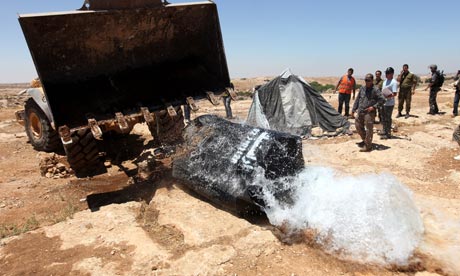Wednesday, 14 September 2011 10:25
 L
Longstanding Times policy supports wealth and power; war, not peace; US hegemony and imperial rampaging; and all things benefitting Israel.
In so doing, it turns a blind eye to its most egregious violations of international law, norms and standards.
It's no surprise that Times editorial policy opposes Palestinian statehood and full UN membership. A previous article explained, accessed through the following link:
Endorsing wrong over right, it’s August 7 "Palestinians and the UN" editorial falsified and distorted key facts. It also suppressed others instead of explaining issues forthrightly.
That's never been NYT's long suit.
Its latest broadside did it again.
Days ahead of "Palestinians plan(ning) to 'defy' the Obama administration by requesting (UN) membership and statehood recognition....there is a growing fear that the Arab-Israeli conflict is entering an explosive new phase."
Despite clear benefits greatly outweighing concerns, Bronner claims "many (predict) disaster, especially after the storming of Israel's Cairo embassy and the expulsion of its ambassador from Turkey."
In fact, Washington and Israeli acquiescence would go a long way to ease, not heighten, tensions, a point Bronner omitted. Instead, he quoted an unnamed "senior Western diplomat," saying:
Israel "will react to a Palestinian statehood bid with punitive measures in the West Bank. Congress will probably cut off aid....The Palestinian Authority could collapse. We're watching a potential train wreck."
Fact check
Under military occupation, Palestinians have no rights. Gazans are suffocating under siege. Daily Israeli attacks and/or incursions into neighborhoods terrorize millions of civilians. Israel at times preemptively declares war. Its modus operandi is death, destruction and immiseration.
Statehood and full UN membership is step one for something better, regardless of how long it takes.
It's already as bad as it gets unless NATO intervenes supportively for Israel. If so, it may do to Gaza, the West Bank and East Jerusalem what it did to Yugoslavia, Afghanistan, Iraq and Libya, turning the Territories to rubble and slaughtering tens of thousands, defending the indefensible on whatever pretext it chooses.
For America, its NATO partners and Israel, it remains a frightening option, given how many previous times it was chosen.
Bronner quoted Yuli Edelstein, Israel's public diplomacy minister, saying:
"If the Palestinians go to the United Nations, it will begin a long funeral for the peace process and negotiations."
Fact check
Of course, Israel long ago buried what for decades it refused to tolerate and won't now. As a result, resurrecting a corpse makes no sense, especially when one willing side has no partner.
Bronner highlights negatives over positive statehood benefits. For example, "rocket(s) from Gaza would be cause to bring them to account."
Fact check
True enough except in self-defense, a universally accepted right. Moreover, ineffective "rockets" only follow multiple Israeli attacks. If Palestinians initiated them, Israel might declare war.
Palestinians have nothing to gain from conflict. In contrast, Israel thrives on it, knowing it can act with impunity.
Bronner also denigrated Palestine's legitimate government, saying:
If the Palestinian Authority under Abbas "ended up withering for lack of support and security cooperation with Israel, Hamas would be waiting in the wings. A Hamas 'takeover' attempt in the West Bank is not something Israel would accept lightly...."
Fact check
In January 2006, Hamas won a decisive 74 seat majority victory as Palestine's legitimate government. Fatah under Abbas got 45, and Prime Minister Salam Fayyad's Third Way party won only 2 of 132 Palestinian Legislative Council seats.
Though almost entirely rejected, he's now illegitimately second in command, serving, like Abbas, as an Israeli collaborationist.
Bronner entirely omitted that context from his article. He also excluded comments from Palestinian statehood advocates. Instead, he concluded, quoting Israeli MK Einat Wilf, saying:
Abbas "knows he is not getting a state. He knows he is not resolving anything. He is simply taking the conflict to another place. (He and other Palestinians) will take each and everybody of the UN and use it as a theater to continue this whole conflict."
Fact check
Of course, conflict persists because of Israeli and Washington obstructionism and belligerence.
Long ago, Palestinians wanted peace, an equitable resolution of longstanding grievances, and a legitimate sovereign state they deserve after Israel stole their homeland in 1948.
Bronner didn't explain. Instead, he one-sidededly backed Israel.
"A United Nations vote on Palestinian membership would be ruinous. Yet with little time left before the UN General Assembly meets, the United States, Israel and Europe have shown insufficient urgency or boldness in trying to find a compromise solution."
Fact check
After 44 years of occupation, statehood and de jure UN membership are long overdue. Opposing it is inexcusable. Nothing less than full recognition is acceptable within 1967 borders, as well as East Jerusalem as its capital.
"Last week, the United States made a listless effort to get Palestinians to forgo the vote in favor of new peace talks. (The) best path to statehood remains negotiations."
Fact check
As explained above, for decades Palestinians have had no willing partner for peace and don't now. Moreover, Israel doesn't negotiate. It demands, with backup muscle like its Washington/paymaster partner.
Nonetheless, the editorial says America "and its Quartet partners (EU, UN and Russia) should put a map and a deal on the table, with a timeline for concluding negotiations and a formal UN statehood vote. The core element: a Palestinian state based on pre-1967 borders with mutually agreed land swaps and guarantees for Israel's security."
Fact check
The same futility repeated numerous previous times. Resurrecting a corpse won't revive it. Relying on Israel and Washington assures subjugation, exploitation, and continuity, not justice or peace.
It's long past time that ended, especially with overwhelming world support when Israel is growing increasingly isolated, and along with America, reviled on Arab streets.
"To get full UN membership the Palestinians have to win Security Council approval."
Fact check
Previous articles explained that the Security Council recommends. Only the General Assembly admits new members by a simple two-thirds majority.
Times writers know it but won't say. Instead, they keep beating the same dead horse lie, plus a blizzard of others daily in print, notably on what's most important.
"Congress has threatened to cut millions of dollars in aid to the Palestinian Authority if it presses for a UN vote. Instead of just threatening the Palestinians, Congress should lean on Mr. Netanyahu to return to talks."
Fact check
True enough. Congress may withhold aid. Perhaps the 113th one will restore it after January 3, 2013.
In the meantime, other states can and should fill the void. It's pocket change for them collectively, even during hard times, especially if they wage less war and more peace.
For his part, Netanyahu doesn't respond to pressure. Efforts are better directed on what works, or at least has a better chance.
"Israel has said it would cut millions of dollars in tax remittances to the authority."
Fact check
Israel no longer would control policies of an independent Palestinian state, including matters relating to taxes.
The piece concludes saying "Washington and its partners will have to limit the damage" following a vote.
In fact, under the best of circumstances, Palestinians are cursed by bordering on a belligerent rogue state, menacingly there all the time.
That's a real concern, including for neighboring states knowing they, too, are vulnerable.
Shut Out of the Process Hamas Responds
On September 12, Haaretz headlined, "Hamas distances itself from Palestinian statehood bid at UN," saying:
Hamas officials said PA efforts omitted Gaza interests entirely. Abbas proceeded on his own, without consulting Hamas, Palestine's legitimate government.
Other Palestinian factions expressed their views. Islamic Jihad also opposes PA efforts. Spokesman Dawood Shihab said the "move needs to be studied to make sure it will not ignore major issues such as the right of return, and the future of the (PLO) as an umbrella for" all Palestinians.
Nothing compromises either if proper procedures are followed. In fact, the right of return for Diaspora Palestinians will be strengthened.
Hamas co-founder Mahmoud Zahar said no one "asked the people of Gaza to take to the streets showing solidarity with the so-called September bid. If the Palestinian Authority calls for that, we will oppose it because they detain people in the West Bank."
"How can I give them the right to demonstrate in Gaza while they do not give us that right in the West Bank?"
Hamas official Mushir al-Masri accused Abbas of acting "without consulting any faction."
An anonymous PA official said Abbas "was surprised by the international opposition to the reconciliation with Hamas so he decided to slow down at least until September."
"Now, with all efforts focused on" petitioning the UN, "we want all voices to be with us. We are not giving the Americans or anyone else a reason to shun us because of the reconciliation or anything else."
The Popular Front for the Liberation of Palestine (PFLP) and The Palestinian National Initiative support petitioning the UN, saying it's the last (or perhaps best) chance for statehood, given the futility of peace talks.
PFLP official Kayid al-Ghoul said:
"We support the Palestinian leadership's plan to go to the UN because (it's) a natural right of the Palestinians and part of the political battle against Israel."
"Regardless of the outcome, this step should be part of the political battle we fight against occupation. It will also be an opportunity to enlarge the circle of solidarity with the Palestinian people's rights, and to expose Israel's policies and the supportive US policy."
Palestinian National Initiative leader Mustafa Barghouti called the UN initiative "the last option for two states," adding "time has come for an alternative. There is no space or place for talks. We won't be slaves to apartheid for the rest of our lives."
He also said if South Sudan could get statehood in 48 hours (no matter that America and EU nations pushed for balkanization), why not Palestinians after decades of failure.
Why not indeed, despite opposition from Washington, Israel, and at least several key European states.
Nothing important ever comes easily. Nothing comes at all without trying. Delay is the enemy of success. Whoever said there's no time like the present got it right.
A Final Comment
Since taking office, Obama's presidency has been defined by duplicity, lawlessness and betrayal.
He proved it by waging multiple imperial wars, lying about why they're fought.
He did it by handing Wall Street giants multi-trillions of taxpayer dollars - called "emergency loans" that perhaps never were repaid. He and the Fed also refused to say how much until finally it was learned that at least $16.1 trillion was involved.
Some observers think it's lots more, plus an open-ended checkbook for as much as they want.
He rubbed it in by demanding austerity cuts during a Main Street Depression when growing tens of millions need help, not a hammer to the back of their heads.
On September 8, his "American Jobs Act" address to Congress was, in fact, another thinly veiled wealth transfer scheme to corporate favorites and super-rich elites already with too much.
He also proposed stealth measures to weaken Social Security and Medicare ahead of destroying them altogether to free up money for more wars and bailouts.
On September 12, he reiterated his contempt for Palestinians, saying:
If Palestinian statehood comes "to the Security Council, we would object very strongly, precisely because we think it would be 'counterproductive.' We don't think that it would actually lead to the outcome that we want, which is a two-state solution."
"Counterproductive" with no "two-state solution?"
Of course, his doublespeak distorts and inverts what Palestinians want and can get if proper procedures are followed.
Obama, Netanyahu and other officials from both countries are pushing to prevent them from achieving rights they've been denied for decades.
It's high time a ground swell of right over wrong support thunderously rejects the criminal class causing so much harm to so many.
It's time it emerges globally against these two rogue states and their duplicitous allies.
When committed and sustained, it's how great victories are won.
Though never easily or quickly, they're only possible by trying.
http://mwcnews.net/focus/politics/13427-new-york-times.html




